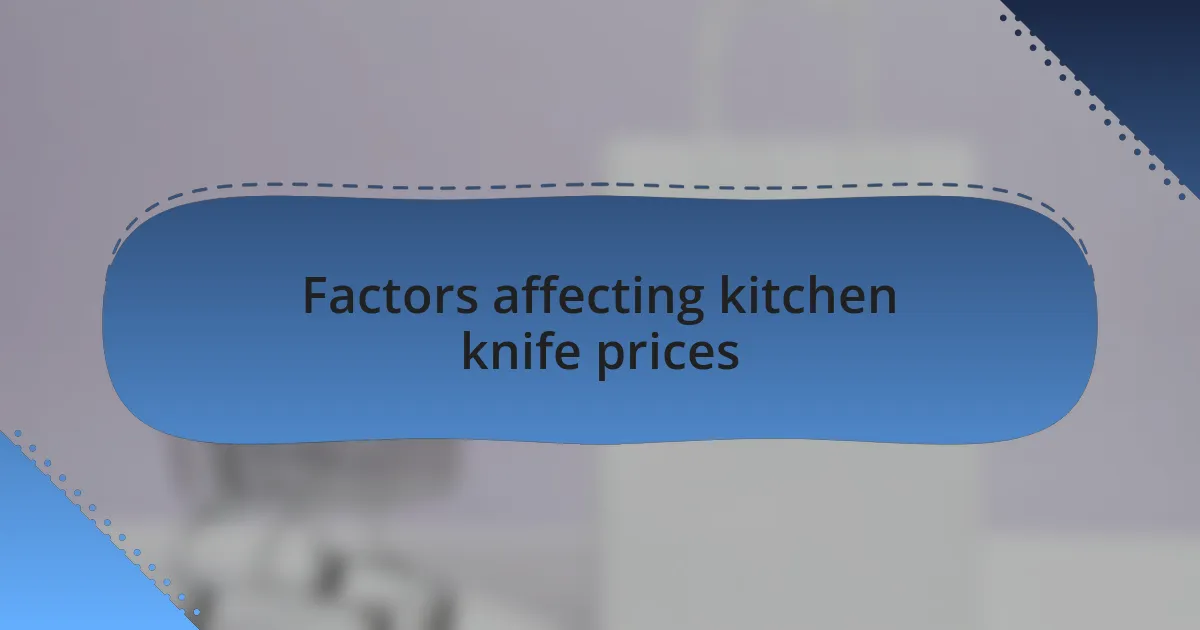Key takeaways:
- Understanding different kitchen knife types, like chef’s knives, paring knives, and bread knives, enhances the cooking experience and efficiency.
- Price comparison is crucial for making informed purchases, helping to identify quality knives and avoid overspending.
- Key factors affecting knife prices include materials, manufacturing processes, and brand reputation, which influence the overall cooking experience.
- Researching knife brands and models, as well as comparing prices from different retailers, can lead to better tools at more affordable prices.

Understanding kitchen knife types
When it comes to kitchen knives, understanding their types is crucial for any cooking enthusiast. I remember the first time I picked up a chef’s knife; its balance and sharpness felt incredible, almost like an extension of my hand. This particular knife is versatile, designed for chopping, dicing, and mincing—a true workhorse in the kitchen. Have you ever experienced the magic of slicing through an onion with ease?
Then there’s the paring knife, small yet mighty. I found myself reaching for it during my first attempt at making a fruit salad. Its precision allowed me to effortlessly peel and trim, turning what could have been a daunting task into a fun, creative experience. Each knife serves a purpose, and discovering them made me appreciate the art of cooking on a deeper level. Have you identified which knife resonates most with your culinary style?
Don’t overlook the bread knife, either—it’s a game changer. The first time I used one, I was amazed at how smoothly it glided through crusty loaves without squishing the soft inside. It’s a reminder that the right tool can transform not only the way we cook but also how we enjoy the results. Reflecting on this, I wonder how many home cooks miss out on the joy of proper knife selection?

Importance of price comparison
When I first started exploring kitchen knives, I realized that price comparison is an essential step in finding the best tools for my culinary adventures. It can be overwhelming with so many options out there, but taking the time to compare prices helped me unveil both quality offerings and inflated gimmicks. Have you ever felt the sinking disappointment of investing in a knife only to find it at a lower price elsewhere?
In my quest for the perfect utility knife, I noticed significant differences in prices across various retailers. By comparing prices, I could identify which brands delivered high performance at reasonable cost. This practice not only saved me money but also gave me peace of mind knowing that I was making a well-informed choice. Isn’t it comforting to feel like you’ve made a smart purchase?
Engaging in price comparison isn’t just about saving a few dollars; it’s about valuing your own investment. Every time I slice through vegetables or carve a roast with precision, I’m reminded of how those wise decisions at the start paid off. Understanding the value of each knife, based on quality and price, enhances the entire cooking experience. Have you ever considered how much impact your tools have on your culinary journey?

Factors affecting kitchen knife prices
There are several key factors that influence kitchen knife prices, one being the materials used in their construction. For instance, when I initially tried a knife made from high-carbon stainless steel, the difference in durability and sharpness blew me away. Have you ever felt the thrill of a blade gliding effortlessly through ingredients? That experience often justifies a higher price tag.
Another important factor is the manufacturing process. I remember the first time I held a hand-forged knife; the weight, balance, and overall craftsmanship felt like an extension of my hand. It’s amazing how artisanal techniques can elevate the price, but I found that investing in such a piece often enhances my cooking joy. Wouldn’t you agree that the right tool can elevate an entire meal?
Brand reputation also plays a sizable role in pricing. Some names are iconic in the culinary world because they’ve built trust over generations. During my knife search, I chose a brand known for its history and reliability, and I must say, every time I use it, I feel a connection to that legacy. Isn’t it rewarding to use a tool that has history and quality behind it?

Researching knife brands and models
When I started my journey to find the best kitchen knives, the sheer number of brands and models was overwhelming. To narrow my options, I spent hours reading reviews and watching comparison videos online. Did you know that certain companies are celebrated for their unique blade designs or ergonomic handles? Exploring these aspects can make all the difference in your cooking experience.
As I researched various knife brands, I discovered that many seem to cater to different types of chefs and cooking styles. For example, some brands focus heavily on professional chefs, creating robust knives that withstand daily use in busy kitchens. I remember trying out a model that was praised for its weight and balance, and it truly transformed how I tackled recipes. Have you ever found a tool that just felt “right” in your hand?
Diving deeper into knife models requires understanding specific features, like blade geometry and handle material. I learned that the right curve on a blade can enhance precision while chopping herbs, which, to my surprise, elevated not just my technique but also my enthusiasm for cooking. What features do you think would improve your culinary adventures?

Comparing prices from retailers
When diving into the realm of kitchen knives, comparing prices from various retailers can be a bit of a treasure hunt. I recall the thrill of discovering a high-quality knife on sale at a local kitchen boutique, only to find the same model listed at a significantly lower price online. This experience taught me that discounts might be hidden, waiting for those willing to explore multiple platforms. Have you ever snagged a deal that made you feel like a savvy shopper?
I’ve learned that prices can differ widely, even for the same knife. For instance, while researching a specific chef’s knife, I stumbled upon a major retailer selling it at a premium, while a smaller e-commerce site offered it at a fraction of the cost. This discrepancy made me rethink my purchasing strategies. Have you considered how much you could save just by checking a few different retailers?
While some shoppers might gravitate towards well-known brands, I’ve found that lesser-known retailers can provide excellent quality at a better price. There’s something exciting about exploring their offerings—sometimes, I’ve even found extraordinary customer service and personalized touches that larger competitors can’t match. Isn’t it refreshing to support smaller businesses while also getting a great deal?

Personal journey in finding knives
Finding the right kitchen knives was a journey marked by both excitement and frustration. I can vividly remember my first visit to a specialty knife store, overwhelmed by the array of options. I picked up a beautifully crafted blade, and despite its hefty price tag, I felt an instant connection. Have you ever held something that just felt right in your hands? That moment ignited my passion for quality knives.
As I continued my search, I made it a point to join online forums dedicated to culinary tools. The conversations there revealed a wealth of knowledge and experiences shared by enthusiasts just like me. I was surprised to discover that some lesser-known brands were praised for their incredible performance, challenging my assumptions about brand reputation. Isn’t it amazing how a community can broaden our horizons and change our perspectives?
Through trial and error, I learned the importance of testing knives in person whenever possible. A memorable experience came when I attended a local knife skills class; the instructor emphasized the significance of the perfect fit between the knife and the user. It was during that class I realized that the best knife isn’t just about the price or brand but about how it feels while cutting. Have you ever felt empowered by mastering a skill, like finding that perfect kitchen companion?